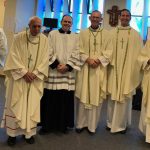Homily for Mass to celebrate the 90thanniversary of the founding of Opus Dei, Saturday, 6thof August, 2018, Parish Church, Knock, Co. Mayo
October 6th, today, is the anniversary of the canonisation of St Josemaría which took place in Rome in 2002. A few days earlier, October 2nd2018 was the 90thanniversary of the foundation of Opus Dei.
A “cherished celebration”
According to the prolific spiritual writer Ronald Rolheiser in his wise words: “What we fail to celebrate we will soon cease to cherish”. Therefore it is good for us to celebrate and cherish milestones and significant anniversaries, especially when they have the possibility of bringing us back to the spirit of founding or radical ideals that enabled something good and significant to come to birth, to expand, to grow and in the fullness of time to thrive and develop.
St. Josemaria – the saint of Ordinary Life
At the canonisation of St Josemaría, Pope St John Paul II, referred to him as “the saint of ordinary life”.Indeed he spent his life proclaiming the universal call to holiness, that God calls each and every person to holiness in and through their ordinary life and daily work. In his homily entitled, “Passionately Loving the World”, delivered in October 1967, St Josemaría preached:
“You must understand now, more clearly, that God is calling you to serve Him in and from the ordinary, material and secular activities of human life. He waits for us every day, in the laboratory, in the operating theatre, in the army barracks, in the university chair, in the factory, in the workshop, in the fields, in the home and in all the immense panorama of work. Understand this well: there is something holy, something divine, hidden in the most ordinary situations, and it is up to each one of you to discover it…
Understand this well: there is something holy, something divine, hidden in the most ordinary situations, and it is up to each one of you to discover it.”
The poet Patrick Kavanagh also reminded us that simple things, from the bits and pieces of life often speak loudest and are often the profoundest.
The Teacher who influenced me most
There is a series in a theological & current affairs journal that I read every week & it’s called ‘reflections on the teacher who influenced me most’. Every week a different person is interviewed about their most influential teacher. An interesting exercise for anyone to do – to think back on who as a teacher stands out in terms of influencing you most as a person, an educator, an inspiration!
Going back to the simple things, basic things that we can often take for granted I remember my professor of Mathematical Physics in College. Because he taught second level science for a number of years in St Nathy’s College, Ballaghdereen before becoming Professor at St Patrick’s College, Maynooth he had an understanding of the basic learning difficulties that students might be having. With that background & experience his aim was to keep things simple. I remember every day without fail at the beginning of his lecture he would routinely explain the two dimensional components of a simple vector A on the cartesian plane. A Cos Thetawas the horizontal component & A Sin Thetawas the vertical component. Patiently he would illustrate this on the board. After a year of classical mechanics even the most challenged in that area, like myself knew it in our sleep. Isaac Newton and his explanation of apples falling on his head due to the necessary menace we call gravitational pull were in the ha’penny place with the Maths-Physics geniuses churned out by Professor Spellman, God increase his glory in heaven!
Back to basics. Simplicity teaches and takes profound roots in our understanding.
Benedict & Francis – Contrasting Styles
One of the many things that I love about Pope Francis is that time and time again like an excellent and inspiring teacher he brings us back to the basics of our faith. Along-with that he has an amazingly inspiring presence. They say that one of the big differences between Pope Benedict and Pope Francis is that with Benedict you came to hear him, but with Francis you come to see and experience some of that charisma. I remember some years ago completing the Via Francigena, the Italian Camino and arriving into Rome being at the general Wednesday audience with Pope Benedict. He spoke brilliantly for about 30 minutes and then went up and down once in the pope-mobile. However, some years later with Pope Francis the experience with him was totally different. He spoke very well for about 5 minutes but spent the remaining 45 minutes or so driving up and down, stopping to meet, greet and hug people on the way. His presence was electric and the congregation came alive!
The Writings of Pope Francis
However along with his electrifying presence I’m a huge fan of his writings! I love the simplicity & transparent joy of the titles & content of his major works.
The Joy of the Gospel – his first major work.
The Joy of Love – on love & the family.
The Name of God is Mercy – in advance of the Year of Mercy.
Praise be to You – Laudato Sion ecology & the environment.
But most of all – Rejoice & be Glad– his most recent work on the universal call of everyone to holiness.
Rejoice & be Glad – Gaudete et Exsultate
Back to basics – the great teacher Francis reminds us in this beautiful letter, Rejoice and be Gladthat he issued on the feast of St Joseph this March that our fundamental call in life is to live good lives, go be holy to save our souls and get to heaven.
Curé of Ars
I’m reminded of the lovely story of the Curé of Ars who was new to the town of Ars. He was lost and met a small boy whom he asked for directions. If you show me the way to Ars, the Curé said to the small boy – I’ll show you, as your pastor the way to heaven!
The Gospel of the Mass of St Josemaría that we just heard proclaimed is Luke 5:1-11: the miraculous catch of fish. Like the responsivness of the Curé of Ars we leave ourselves to be open to being caught, being captivated, entering into the net of holiness, salvation and eternal life!
Scripture calls us to Holiness
In his opening words of Rejoice and be Glad Pope Francis quotes scripture. For the Lord has chosen each one of us “to be holy and blameless before him in love.” Eph 1:4.
Still returning to basics (A Cos Theta, A Sin Theta) I’m reminded of the introductory words of the old Catechism and also St Ignatius of Loyola in The Spiritual Exercises who tells us that The reason that God created us is “to know, love and serve Him”.
The Challenge of Holiness
Yet what is this difficult and challenging concept of “holiness”, defined as being set apart, trying to be as Christ-like as possible. I’m sure we have all heard of the dictum: “Paddy Murphy went to Mass, never missed a Sunday. Paddy Murphy went to hell for what he did on Monday”! Like the example and profound gestures of Pope Francis that of course are much more than gestures we are called to literally do ‘what it says on the tin’ in being genuine followers of Jesus. Pope Francis concludes his opening chapter in Rejoice & be Gladby quoting the words of Leon Bloy who says when all is said and done “ the only great tragedy in life, is not to become a saint”!
Pathways to Holiness
Pope Francis astutely reflects on certain aspects of our world that might make it more challenging on the journey to holiness. He speaks of heightened individualism. Hedonism, the pursuit of pleasure. Consumerism, the pursuit of money & material goods. He also comments on a feature of our culture that he terms an over attachment to the digital world. In this context he speaks of a “Culture of zapping” that keeps us on the superficial level of things and might prevent us from exploring the deeper meaning and depths of themes and topics, worth exploring.
Beatitudes
At the heart of Rejoice & be Gladis a beautiful chapter on the Spirit & Mission that exudes from the beatitudes in the Sermon on the Mount from Jesus. The Beatitudes are like a Christian’s identity card he tells us. In the Beatitudes, we find a portrait of the Master, which we are called to reflect in our daily lives, Jesus Christ.
Sense of Humour
One of the things I liked very much about the papal document was the emphasis on the importance of a sense of humour in pursuit of holiness. Again he cites scripture (Phil 4:4) “Rejoice in the Lord always; I say it again, rejoice.”
Prayer of Thomas More – page 71
Pope Francis quotes the prayer of St. Thomas More “Grant me, O Lord, good digestion, and also something to digest. Grant me a healthy body, and the necessary good humour to maintain it. Grant me a simple soul that knows to treasure all that is good and that doesn’t frighten easily at the sight of evil, but rather finds the means to put things back in their place. Give me a soul that knows not boredom, grumbling, sighs and laments, nor excess of stress, because of that obstructing thing called “I”. Grant me, O Lord, a sense of good humour. Allow me the grace to be able to take a joke and to discover in life a bit of joy, and to be able to share it with others”!
Power of the devil & evil in the world is real.
In the final chapter of the document Francis reminds us of the reality, existence and challenge of evil and the devil in the world around us. To help us fight this challenge we are called to be Vigilant. To be Prayerful. To avail of the Sacrament of Reconciliation often. To have Regular Connection with the community of the Church.
Being Part of Church
You see faith flourishes on connections. Religious belief is ‘a solitary exercise best done with others’. Prayer, Fasting, Giving to Charity, Celebrating the Eucharist, Rosary, Eucharistic Adoration, Pilgrimage, Various Devotions build up these connections in the mystical body that is the Church of Jesus Christ on earth.
Balance between the contemplative & active
And then of course for all of us there is what is often called the Martha & Mary dilemma, working out the tension between the call to prayer and the call to action. For the true disciples that balance is not so much a tension, but a union, the two merge into one with good advice, wise counsel, an open ear to the promptings of the Holy Spirit, solid spiritual direction with an experienced anam cara.
The Challenge to live Holy Lives is not an easy one
All of this about what I’ve been talking is not easy. Trying to be holy in the world we live in is quite a challenge. It’s tough. We may naturally get bored with the routine & persistence associated with it.
The Dark night of the Soul experience of Purification
Then of course within that and a topic for another day perhaps – for those who take the honours course in Holiness there’s a thing called the “Dark night of the soul” – a challenge and curve ball that God often throws in our path to make us grow and mature in the spiritual life.
The happiness of prayer, contemplation and holiness is a true happiness; indeed the supreme happiness; but is founded upon sorrow. “Delightful fear”, says Gerard Manley Hopkins. “Fear with joy the Last Judgement.” (Poet Elisabeth Langasser).
Teresa of Avila, one of the great mystics has asserted that more courage is required to lead a life of contemplation than to elect martyrdom! And that’s coming from the mouth of the expert who knows!
In our frustration for perfection and advancement in this area St Augustine settles us: “Do what you can and to ask for what you cannot.”
Happiness and Contemplation
If I could give a recommendation of a good book on this topic, it’s a work called: Happiness & Contemplation by Joseph Pieper.
It’s an exploration of what happiness & joy is in our world. A certain amount of happiness and fulfillment will be attained from the things of this life but in the end of the day the ultimate happiness in life is contemplation of the Lord. He’s with St Augustine that Our hearts are fundamentally restless until they rest in the beatific vision of God.
Holiness through and within Opus Dei
The spirit of Opus Dei teaches us to try to find and love the Lord in the ordinary bits and pieces of daily life. St Josemaría reminds us that by trying to do our daily work well, we come close to the Lord and bring others close to Him too. Work is truly a means of sanctification for ourselves and for others.
It is also in ordinary life, in our daily interactions with others, in conversations with family and friends, and through example and friendship, that we live out the vocation of all Christians to be apostles of the joy of the Gospel.
This is how we can “put out into the deep” (as spoken of in today’s Gospel). With renewed joy and courage let us take up the Holy Father’s invitation to us recently in Ireland “to ‘go forth’ to bring the words of eternal life to all the peripheries of our world” (Francis, Homily, Phoenix Park, 26thAugust, 2018).
Congratulations, good wishes and blessings
Congratulations to all members of Opus Dei on this significant milestone anniversary, just ten years short of a centenary. May the Lord continue to bless you in all that you do, in the pursuit of the sanctification of time through the work of the Lord in bringing about the Kingdom of God to all that we do and all that we meet.





